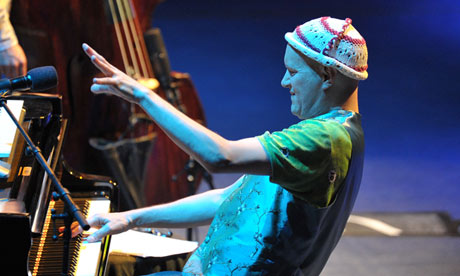
As most of the music world knows, the jazz-sax genius Charlie Parker's nickname was Bird. As a coterie of it knows, the childhood call for help of British pianist-composer Django Bates was to whistle bebop tunes on railway platforms in the hope of finding a soulmate, which he did. Bates thus hatched his first jazz encounters by meeting "through whistled song", as his programme-note points out at the Proms, "in the way that real birds do".
In his trademark woolly hat, and with his typical spring in the step – from the piano stool, to conducting on the run, to leaping about among the promenaders – Bates played Prom 62 with his trio (Petter Eldh on double bass and Peter Bruun on drums) and Sweden's vigorous Norrbotten Big Band. The focus was the leader's rhythmically wayward, deconstructive reworkings of Parker classics, plus a lurching, arrhythmically riffy original (We Are Not Lost, We Are Simply Finding Our Way), and a premiere, The Study of Touch.
Bates's problem was to square the big band's need for order with his trio's fluid spontaneity, and he mostly solved it. The mix sounded muddy and overawed on the opener – Parker's twisting Scrapple from the Apple – the clearest passages just featuring Bates's weaving piano improvisations shadowed by Eldh's rumbling basslines and the patter of Bruun's daintily erratic drumming. But gently dissonant reeds and brass harmonies, as well as some sparing electronics, firmly embraced the trio's squirmings on the film noir ballad Laura, before a fast Donna Lee had the band punching out rejoinders as gracefully funky as Weather Report's.
Bates's The Study of Touch (commissioned by the Norrbotten International Music Centre's New Directions) began and ended with an affectingly pensive four-note motif, bookending the plaintive wail of Håkan Broström's soprano saxophone and the tersely lyrical tenor sax of Karl-Martin Almqvist. Parker's beautiful Ah-leu-Cha was introduced with jubilant uptempo drive by the band before Bates's yearningly slow version resolved it, and Ashley Slater's Nat King Cole-like vocal on A House Is Not a Home was gracefully morphed into a quiet big-band medley of Parker themes. The Latin dance My Little Suede Shoes was tight and slinky, and Bates – wandering happily among his musicians and waywardly waving his arms – drew shimmery, Gil Evans-like high harmonies out of the band in a delectable version of Star Eyes. The show started unsteady and ended up sublime, just the way a lot of the best jazz gigs do.
• Did you catch this show – or any other recently? Tell us about it using #gdnreview

